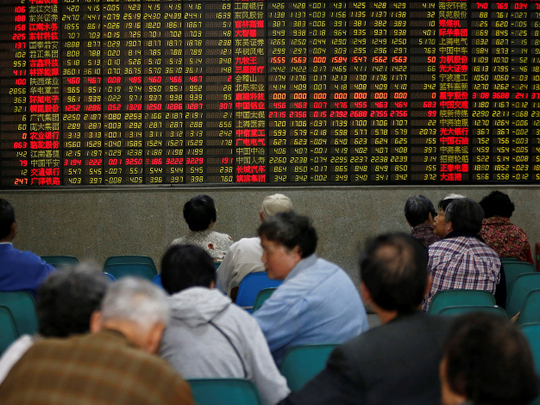
Hong Kong, Kuala Lumpur: Emerging-market stocks dropped for a sixth day, the longest losing streak since December, as speculation the Federal Reserve will raise interest rates this year sapped investor appetite for higher-yielding assets.
A gauge of developing-nation currencies is heading for its worst week since the start of January as the dollar strengthened before a U.S. payroll report forecast to add to evidence the world's largest economy is strong enough to justify higher borrowing costs.
Hong Kong-listed China stocks dropped 5.1 percent this week, while South Africa's rand and Turkey's lira have weakened at least 4.5 percent.
Philippine stocks and the peso extended a three-week loss before a presidential election on Monday.
"Risk appetite has taken a turn south this week with equities heading lower," said Vishnu Varathan, a Singapore-based economist at Mizuho Bank Ltd.
"A stronger dollar has not helped either. Despite softer incoming data, the Fed has not ruled out rate hikes this year so dollar bears have had to take a break this week."
Unhappy Month
Emerging-market assets are having a miserable start to May as a rally from January to April starts to unwind. The Fed is on course to add to its December rate increase some time this year, with four regional presidents saying this week they were open to considering an interest-rate increase as soon as its June meeting.
The MSCI Emerging Markets Index of shares slid 0.7 percent Friday as of 11:12 a.m. in Hong Kong, extending this week's decline to 4.3 percent, the most since the period ended Jan. 8. All 10 industry groups slipped, led by industrials and information technology companies.
The Hang Seng China Enterprises Index, which tracks Hong Kong-listed China companies, fell for a fifth day, losing 1.7 percent after data for Chinese manufacturing released in the past week missed economists' forecasts. The gauge has dropped 12 percent this year.
'Weak Side'
"Some macro data this week has raised doubts over the sustainability of economic rebound which is causing the market to pull back," said Linus Yip, a Hong Kong-based strategist at First Shanghai Securities Ltd. "The market is on a weak side and gripped in a correction. It seems to be some stimulus needed for the market to stage a rebound."
The Philippines Stock Exchange Index fell 0.5 percent before Monday's vote, which polls indicate will be won by Davao City mayor Rodrigo Duterte.
The peso dropped 0.1 percent, increasing this week's decline to 0.9 percent. South Korea, Indonesia, and Thailand are closed for holidays.
The MSCI Emerging Markets Currency Index dropped 0.3 percent as Malaysia's ringgit depreciated 0.1 percent, extending its losses this week to 2.5 percent.
St. Louis Fed chief James Bullard, San Francisco's John Williams, Robert Kaplan of Dallas and Atlanta's Dennis Lockhart all stressed in separate remarks Thursday that policy would be data dependent and the June 14-15 meeting of the Federal Open Market Committee was on the table.
There's a 10 percent chance the Fed will raise its benchmark rate in June and 49 percent odds by year-end, according to data compiled by Bloomberg based on fed fund futures. The calculations assume the effective fed funds rate will average 0.625 percent after the next increase.











